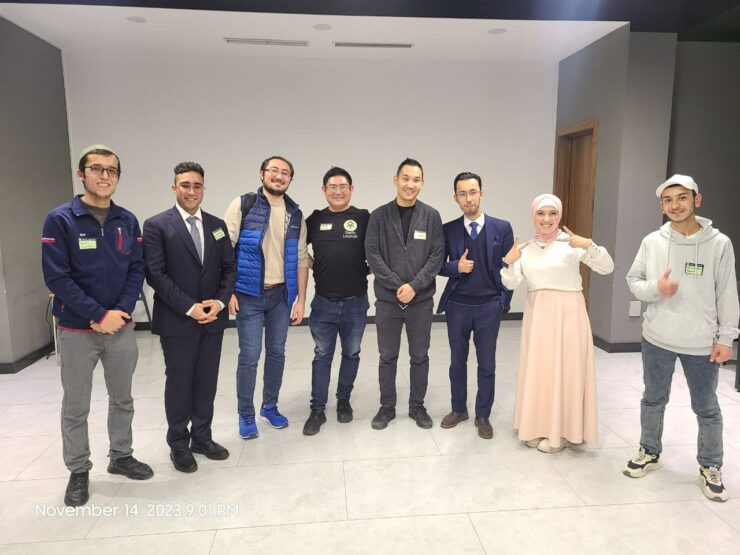Back in 2013, Stephen Lin, now a venture capital partner at London-based VC firm Sturgeon Capital, was tapped by his USC professor to teach a seminar in Kazakhstan.
He flew to the capital of Almaty, not knowing much about the region.
At the end of the seminar, he was asked to establish an entrepreneurship center at the local university. Despite limited resources, the center prospered, and Lin became a teacher and mentor, helping students launch their businesses.
“Three weeks somehow became three years,” he told Icebreaker.
While the startup scene in Uzbekistan is still evolving, Sturgeon Capital saw the market’s potential. Founded in 2016 and focused on frontier, fast-growing markets primarily in Central and South Asia, the fund has around $300 million in assets. In Central Asia, they’re currently active in Kazakhstan, Kyrgyzstan, Georgia and Uzbekistan.
Last year, it tasked Stephen Lin with the development of an accelerator program that would be specifically tailored to the local market’s strengths and weaknesses.
After completing the first institutional close for their second early-stage technology fund (Sturgeon Emerging Opportunities II) last year, the firm plans to launch its next PE fund later in 2024.
And with the launch of the accelerator, Sturgeon Capital is looking to expand its portfolio in Uzbekistan, where it has already invested in a few startups.
Uzbekistan’s Appeal
Located in the heart of Central Asia, Uzbekistan is a country with a deep-rooted history as a trading spot on the ancient Silk Road.
With its rapidly growing, young population, including 20 million people of working age and 60% of the population under 30, the country has a vast human capital to offer. Moreover, with 99% of the population having access to the internet, Uzbekistan has the infrastructure and economic growth numbers to entice a global VC firm.
Still, the startup ecosystem in Uzbekistan is nascent and the funding and resources are limited. Sturgeon Capital’s 2022 Impact Report noted that there has been only $7 million of venture capital (VC) investment in 2022, with $0.20 VC funding per capita.
Sturgeon Capital sees Uzbekistan as an attractive emerging market, which has undergone a rapid digitalization of economy and society underpinned by increasing internet penetration and driven by accelerated venture funding.
Robin Butler, partner and head of impact at Sturgeon Capital, thinks increased technology adoption coupled with a large young, well-educated population, high GDP growth, internet penetration rate, and a diversified economy signal great potential for the country.
“We all know about the opportunity here, we’re here, we’ve seen it, we’ve invested in it, we’ve operated in this environment,” Butler said during his speech at the annual ICT Week in Tashkent last year.
He noted the firm’s investment approach is to focus on the markets with a funding gap and then try to fill it.
So far, the company has backed six startups in Uzbekistan, primarily in the fintech and B2B SaaS sectors since 2019. These include online retail automation startup Billz, fintech company oasis, and AI-based e-commerce insights platform Tass Vision.
A New Kind of Accelerator for Central Asia
Swift Launch, which officially got its start in October 2023, was designed to support new entrepreneurs, from pre-team stage to early VC seed funding. The program aims to create new teams worth $500,000 within eight months.
Following extensive market research of the strengths and weaknesses in Uzbekistan’s startup scene, Lin realized that the market differs from the US or European ones significantly.
“In some ways, I would say it’s the polar opposite,” Lin noted, adding that the capital does not flow efficiently, and interest rates are very high.
One of the main issues was that local initiatives were trying to adopt the US model. Instead of importing an old model, Lin designed a new incubator model in partnership with Aloqa Ventures, Big Sky Capital, and local businesses, specifically for the local market.
For investors like Lin, the market opportunities in Uzbekistan–the untapped potential of many industries, reduced competition, underutilized skilled labor, cost affordability, and governmental support initiatives–outweigh the risks.
“Skilled labor here is so vastly underused that we can scale big on several teams at a fraction of the cost,” he said.
In the end, the Swift Launch emerged as a two-semester entrepreneurship program modeled on the world-renowned Lean LaunchPad methodology developed at UC Berkeley and Stanford University. It’s providing startup founders with training and coaching sessions from experienced venture capitalists and entrepreneurs from California.
Other perks include seed grant funding of up to $1,000, an opportunity for eligible teams to represent Uzbekistan overseas. In addition, the accelerator offers networking opportunities and monthly speaker sessions from companies like Meta, Google and Tinder.
The accelerator’s venture approach combines incubator and venture studio characteristics specifically designed for emerging markets. In most larger markets, thousands of startups would typically apply to join an incubation program.
“That model wouldn’t work here because there just aren’t enough teams. So we go one step earlier to the very beginning and recruit people just interested in entrepreneurship,” explained Lin, noting how the model differentiates from traditional incubators. This method allows teams to acquire their first customer early, reducing time spent on networking and sales.
The significant differences lie in their customer-centric approach, pre-selling teams to corporations before formation, engaging teams at the earliest stages for a synergistic effect, and a modular program design for scalability and efficiency.
The accelerator program, which is entirely run through the Telegram channel, currently has 60 cohort members working on 12 new startups.
“Our entire program is run through a telegram channel. Right now we have a developer, a coach [who] will assign a task in Telegram, a Telegram bot, and then the teams will report their progress over eight months,” Lin explains. “We have a developer working on extracting that data from the Telegram chat into an online dashboard.”
Tackling Challenges
Uzbekistan is a country with unique opportunities and challenges.
Following a transition from an authoritarian socialist Soviet republic to a free market economy, even though a whole new generation grew up after the fall of the Soviet Union, a lot of the critical infrastructure has yet to be developed.
No innovation comes without its big and small obstacles, especially in startups and emerging markets.
“We were just blindsided by a lot of small problems that I didn’t expect to be problems,” said Lin, referring to bank transfer account difficulties and legal and corporate problems in starting a firm in Uzbekistan. The IT Park in Uzbekistan is gradually addressing these problems.
More specifically, the Swift Launch team has experienced challenges with signing contracts and other technical hurdles. This meant that for some time, they were not able to accept funds.
There are also cultural differences they had to deal with.
“It’s harder when people come in with the expectation that they can’t do it,” Lin said, highlighting a fundamental lack of confidence some founders struggle with. He wants to change this by incorporating psychological aspects into his teaching and coaching materials.
He hopes to expand the program across more cities in the country, capitalizing on the low cost of physical offices, leveraging partnerships, and government programs such as the “One Million Coders” program.
In the future, Swift Launch wants to increase the participant count of the next cohort to about 100, double it with the following one, and invite more new guest lecturers.
“By providing international-level expertise to aspiring entrepreneurs, Stephen Lin’s initiative addresses some of Uzbekistan’s most pressing needs to develop local startup ecosystems,” says Adrien Henni of Paris-based think tank Alliance Tech, who works with startups and support organizations in Central Asia. “The country can realize its potential only by raising entrepreneurs’ skills and opening them up to the world.”






Add comment